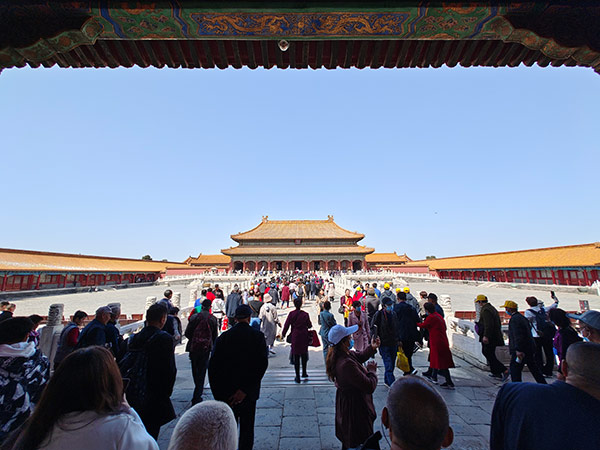Imperial measures
By Deng Zhangyu | China Daily | Updated: 2021-04-23 09:40

On the subject of protection, Wang says fire prevention is on top of the museum's agenda. Smoking is absolutely prohibited anywhere in the Forbidden City and many halls eschew the use of electricity, relying only on what little natural light is available.
This caution was amplified following the 2019 fire that destroyed the Notre Dame Cathedral in Paris. Alarmed, the museum administrators opted against installing electric lighting in important halls, such as Tai He Dian, the palace's highest-status building that once hosted the most important ceremonies, and Bao He Dian, or the Hall of Preserving Harmony. Both are, arguably, the biggest draws for visitors to the palace.
"I hope the public can understand our reasoning," said Wang, adding that the lack of artificial lighting in the halls does hamper the experience somewhat.
Over the palace's 600-year history, it has endured numerous fires, and areas have been rebuilt by different emperors.
Asked by a member of the British media about the relationship between popular culture and traditional culture that the Palace Museum promotes, Wang said a few popular TV dramas focusing on events that occurred in the Forbidden City do not necessarily offer the best experience for people to appreciate the art and beauty of the palace.
"We still need to explore how to use films, literature, animation and even games to show the wisdom our forebears imbued into the palace, including the culture, art, architecture and science," said Wang.
According to him, the Forbidden City has been transformed from an imperial architectural complex to a museum for the people. Under the context of globalization, the museum should shoulder the responsibility of organizing shows that display the process of cultural exchanges and communication.
He said, within its collection, it is recorded that when a society is open and encourages cultural exchange and communication, it is often prosperous and thriving.
"We welcome visitors, scholars and researchers who are interested in the palace to communicate with us."
























